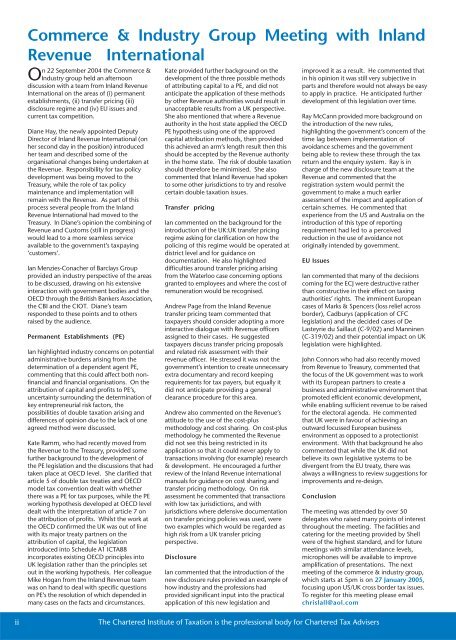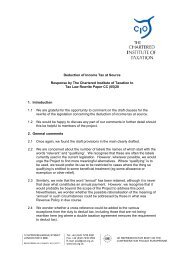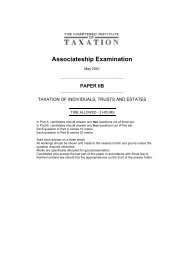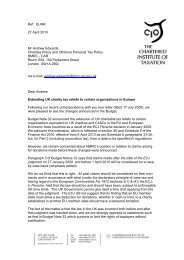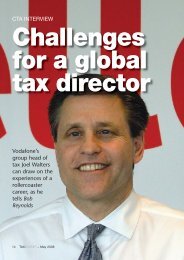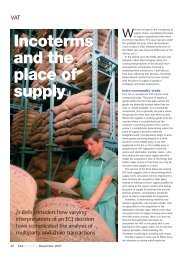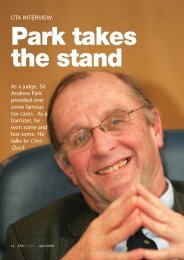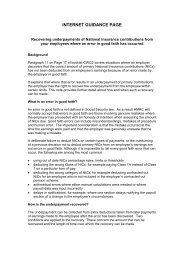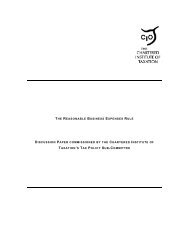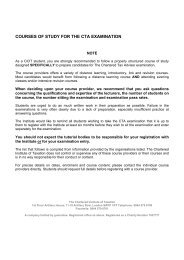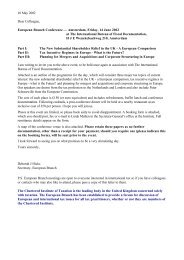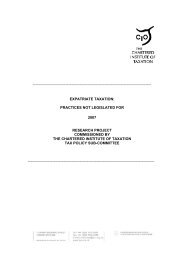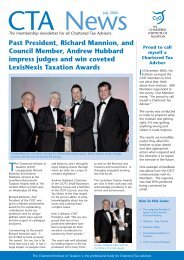CTA News Jan 2005 - CIOT - The Chartered Institute of Taxation
CTA News Jan 2005 - CIOT - The Chartered Institute of Taxation
CTA News Jan 2005 - CIOT - The Chartered Institute of Taxation
You also want an ePaper? Increase the reach of your titles
YUMPU automatically turns print PDFs into web optimized ePapers that Google loves.
Commerce & Industry Group Meeting with Inland<br />
Revenue International<br />
On 22 September 2004 the Commerce &<br />
Industry group held an afternoon<br />
discussion with a team from Inland Revenue<br />
International on the areas <strong>of</strong> (i) permanent<br />
establishments, (ii) transfer pricing (iii)<br />
disclosure regime and (iv) EU issues and<br />
current tax competition.<br />
Diane Hay, the newly appointed Deputy<br />
Director <strong>of</strong> Inland Revenue International (on<br />
her second day in the position) introduced<br />
her team and described some <strong>of</strong> the<br />
organisational changes being undertaken at<br />
the Revenue. Responsibility for tax policy<br />
development was being moved to the<br />
Treasury, while the role <strong>of</strong> tax policy<br />
maintenance and implementation will<br />
remain with the Revenue. As part <strong>of</strong> this<br />
process several people from the Inland<br />
Revenue International had moved to the<br />
Treasury. In Diane’s opinion the combining <strong>of</strong><br />
Revenue and Customs (still in progress)<br />
would lead to a more seamless service<br />
available to the government’s taxpaying<br />
‘customers’.<br />
Ian Menzies-Conacher <strong>of</strong> Barclays Group<br />
provided an industry perspective <strong>of</strong> the areas<br />
to be discussed, drawing on his extensive<br />
interaction with government bodies and the<br />
OECD through the British Bankers Association,<br />
the CBI and the <strong>CIOT</strong>. Diane’s team<br />
responded to these points and to others<br />
raised by the audience.<br />
Permanent Establishments (PE)<br />
Ian highlighted industry concerns on potential<br />
administrative burdens arising from the<br />
determination <strong>of</strong> a dependent agent PE,<br />
commenting that this could affect both nonfinancial<br />
and financial organisations. On the<br />
attribution <strong>of</strong> capital and pr<strong>of</strong>its to PE’s,<br />
uncertainty surrounding the determination <strong>of</strong><br />
key entrepreneurial risk factors, the<br />
possibilities <strong>of</strong> double taxation arising and<br />
differences <strong>of</strong> opinion due to the lack <strong>of</strong> one<br />
agreed method were discussed.<br />
Kate Ramm, who had recently moved from<br />
the Revenue to the Treasury, provided some<br />
further background to the development <strong>of</strong><br />
the PE legislation and the discussions that had<br />
taken place at OECD level. She clarified that<br />
article 5 <strong>of</strong> double tax treaties and OECD<br />
model tax convention dealt with whether<br />
there was a PE for tax purposes, while the PE<br />
working hypothesis developed at OECD level<br />
dealt with the interpretation <strong>of</strong> article 7 on<br />
the attribution <strong>of</strong> pr<strong>of</strong>its. Whilst the work at<br />
the OECD confirmed the UK was out <strong>of</strong> line<br />
with its major treaty partners on the<br />
attribution <strong>of</strong> capital, the legislation<br />
introduced into Schedule A1 I<strong>CTA</strong>88<br />
incorporates existing OECD principles into<br />
UK legislation rather than the principles set<br />
out in the working hypothesis. Her colleague<br />
Mike Hogan from the Inland Revenue team<br />
was on hand to deal with specific questions<br />
on PE’s the resolution <strong>of</strong> which depended in<br />
many cases on the facts and circumstances.<br />
Kate provided further background on the<br />
development <strong>of</strong> the three possible methods<br />
<strong>of</strong> attributing capital to a PE, and did not<br />
anticipate the application <strong>of</strong> these methods<br />
by other Revenue authorities would result in<br />
unacceptable results from a UK perspective.<br />
She also mentioned that where a Revenue<br />
authority in the host state applied the OECD<br />
PE hypothesis using one <strong>of</strong> the approved<br />
capital attribution methods, then provided<br />
this achieved an arm’s length result then this<br />
should be accepted by the Revenue authority<br />
in the home state. <strong>The</strong> risk <strong>of</strong> double taxation<br />
should therefore be minimised. She also<br />
commented that Inland Revenue had spoken<br />
to some other jurisdictions to try and resolve<br />
certain double taxation issues.<br />
Transfer pricing<br />
Ian commented on the background for the<br />
introduction <strong>of</strong> the UK:UK transfer pricing<br />
regime asking for clarification on how the<br />
policing <strong>of</strong> this regime would be operated at<br />
district level and for guidance on<br />
documentation. He also highlighted<br />
difficulties around transfer pricing arising<br />
from the Waterloo case concerning options<br />
granted to employees and where the cost <strong>of</strong><br />
remuneration would be recognised.<br />
Andrew Page from the Inland Revenue<br />
transfer pricing team commented that<br />
taxpayers should consider adopting a more<br />
interactive dialogue with Revenue <strong>of</strong>ficers<br />
assigned to their cases. He suggested<br />
taxpayers discuss transfer pricing proposals<br />
and related risk assessment with their<br />
revenue <strong>of</strong>ficer. He stressed it was not the<br />
government’s intention to create unnecessary<br />
extra documentary and record keeping<br />
requirements for tax payers, but equally it<br />
did not anticipate providing a general<br />
clearance procedure for this area.<br />
Andrew also commented on the Revenue’s<br />
attitude to the use <strong>of</strong> the cost-plus<br />
methodology and cost sharing. On cost-plus<br />
methodology he commented the Revenue<br />
did not see this being restricted in its<br />
application so that it could never apply to<br />
transactions involving (for example) research<br />
& development. He encouraged a further<br />
review <strong>of</strong> the Inland Revenue international<br />
manuals for guidance on cost sharing and<br />
transfer pricing methodology. On risk<br />
assessment he commented that transactions<br />
with low tax jurisdictions, and with<br />
jurisdictions where defensive documentation<br />
on transfer pricing policies was used, were<br />
two examples which would be regarded as<br />
high risk from a UK transfer pricing<br />
perspective.<br />
Disclosure<br />
Ian commented that the introduction <strong>of</strong> the<br />
new disclosure rules provided an example <strong>of</strong><br />
how industry and the pr<strong>of</strong>essions had<br />
provided significant input into the practical<br />
application <strong>of</strong> this new legislation and<br />
improved it as a result. He commented that<br />
in his opinion it was still very subjective in<br />
parts and therefore would not always be easy<br />
to apply in practice. He anticipated further<br />
development <strong>of</strong> this legislation over time.<br />
Ray McCann provided more background on<br />
the introduction <strong>of</strong> the new rules,<br />
highlighting the government’s concern <strong>of</strong> the<br />
time lag between implementation <strong>of</strong><br />
avoidance schemes and the government<br />
being able to review these through the tax<br />
return and the enquiry system. Ray is in<br />
charge <strong>of</strong> the new disclosure team at the<br />
Revenue and commented that the<br />
registration system would permit the<br />
government to make a much earlier<br />
assessment <strong>of</strong> the impact and application <strong>of</strong><br />
certain schemes. He commented that<br />
experience from the US and Australia on the<br />
introduction <strong>of</strong> this type <strong>of</strong> reporting<br />
requirement had led to a perceived<br />
reduction in the use <strong>of</strong> avoidance not<br />
originally intended by government.<br />
EU Issues<br />
Ian commented that many <strong>of</strong> the decisions<br />
coming for the ECJ were destructive rather<br />
than constructive in their effect on taxing<br />
authorities’ rights. <strong>The</strong> imminent European<br />
cases <strong>of</strong> Marks & Spencers (loss relief across<br />
border), Cadburys (application <strong>of</strong> CFC<br />
legislation) and the decided cases <strong>of</strong> De<br />
Lasteyrie du Saillaut (C-9/02) and Manninen<br />
(C-319/02) and their potential impact on UK<br />
legislation were highlighted.<br />
John Connors who had also recently moved<br />
from Revenue to Treasury, commented that<br />
the focus <strong>of</strong> the UK government was to work<br />
with its European partners to create a<br />
business and administrative environment that<br />
promoted efficient economic development,<br />
while enabling sufficient revenue to be raised<br />
for the electoral agenda. He commented<br />
that UK were in favour <strong>of</strong> achieving an<br />
outward focussed European business<br />
environment as opposed to a protectionist<br />
environment. With that background he also<br />
commented that while the UK did not<br />
believe its own legislative systems to be<br />
divergent from the EU treaty, there was<br />
always a willingness to review suggestions for<br />
improvements and re-design.<br />
Conclusion<br />
<strong>The</strong> meeting was attended by over 50<br />
delegates who raised many points <strong>of</strong> interest<br />
throughout the meeting. <strong>The</strong> facilities and<br />
catering for the meeting provided by Shell<br />
were <strong>of</strong> the highest standard, and for future<br />
meetings with similar attendance levels,<br />
microphones will be available to improve<br />
amplification <strong>of</strong> presentations. <strong>The</strong> next<br />
meeting <strong>of</strong> the commerce & industry group,<br />
which starts at 5pm is on 27 <strong>Jan</strong>uary <strong>2005</strong>,<br />
focusing upon US/UK cross border tax issues.<br />
To register for this meeting please email<br />
chrislall@aol.com<br />
ii<br />
<strong>The</strong> <strong>Chartered</strong> <strong>Institute</strong> <strong>of</strong> <strong>Taxation</strong> is the pr<strong>of</strong>essional body for <strong>Chartered</strong> Tax Advisers


